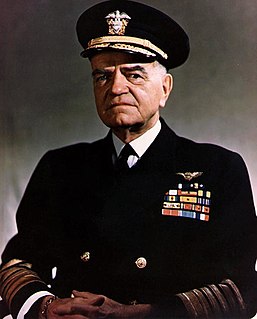A Quote by William Halsey
[Admiral Nelson's counsel] guided me time and again. On the eve of the critical battle of Santa Cruz, in which the Japanese ships outnumbered ours more than two to one, I sent my task force commanders this dispatch: ATTACK REPEAT ATTACK. They did attack, heroically, and when the battle was done, the enemy turned away. All problems, personal, national, or combat, become smaller if you don't dodge them, but confront them. Touch a thistle timidly, and it pricks you; grasp it boldly, and its spines crumble. Carry the battle to the enemy! Lay your ship alongside his!
Quote Topics
Admiral
Again
Alongside
Attack
Away
Battle
Become
Boldly
Carry
Combat
Commanders
Confront
Counsel
Critical
Crumble
Cruz
Did
Dodge
Done
Enemy
Eve
Force
Grasp
Guided
His
Japanese
Lay
Me
More
National
Nelson
Ours
Outnumbered
Personal
Problems
Repeat
Santa
Santa Cruz
Sent
Ship
Ships
Smaller
Task
Task Force
Than
Them
Time
Touch
Turned
Two
Which
Your
Related Quotes
In a time of war the nation is always of one mind, eager to hear something good of themselves and ill of the enemy. At this time the task of the news-writer is easy; they have nothing to do but to tell that a battle is expected, and afterwards that a battle has been fought, in which we and our friends, whether conquering or conquered, did all, and our enemies did nothing.
My final words of advice to you are educate, agitate and organize; have faith in yourself. With justice on our side I do not see how we can loose our battle. The battle to me is a matter of joy. The battle is in the fullest sense spiritual. There is nothing material or social in it. For ours is a battle not for wealth or for power. It is battle for freedom. It is the battle of reclamation of human personality.
The art of the indirect approach can only be mastered, and its full scope appreciated, by study of and reflection upon the whole history of war. But we can at least crystallize the lessons into two simple maxims- one negative, the other positive. The first is that, in face of the overwhelming evidence of history, no general is justified in launching his troops to a direct attack upon an enemy firmly in position. The second, that instead of seeking to upset the enemy's equilibrium by one's attack, it must be upset before a real attack is, or can be successfully launched
When envoys are sent with compliments in their mouths, it is a sign that the enemy wishes for a truce. If the enemy's troops march up angrily and remain facing ours for a long time without either joining battle or removing demands, the situation is one that requires great vigilance and circumspection. To begin by bluster, but afterward to take fright at the enemy's numbers, shows a supreme lack of intelligence.
If asked how to cope with a great host of the enemy in orderly array and on the point of marching to the attack, I should say: "Begin by seizing something which your opponent holds dear; then he will be amenable to your will." Rapidity is the essence of war: take advantage of the enemy's unreadiness, make your way by unexpected routes, and attack unguarded spots.
Once committed to an attack, fly in at full speed. After scoring crippling or disabling hits, I would clear myself and then repeat the process. I never pursued the enemy once they had eluded me. Better to break off and set up again for a new assault. I always began my attacks from full strength, if possible, my ideal flying height being 22,000 ft because at that altitude I could best utilize the performance of my aircraft. Combat flying is based on the slashing attack and rough maneuvering.
I'm so disappointed, Ichigo, so very disappointed. Sadly, your sword exhibits only fear. When you counter, it's because you fear being killed. When you attack, you fear killing. And when you protect someone, you fear you could let them die. At this point, the only thing your sword speaks is sensless fright, and that's not good. What you don't need in battle is fear. Nothing will come of it. When you counter, you don't let them cut you. When you protect someone, you don't let them die. And when you attack, you kill." -Kisuke Urahara (Bleach)
































